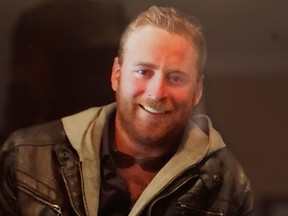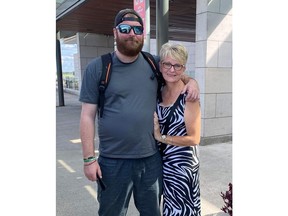Russell McIsaac’s symptoms were initially brushed off. When the 35-year-old was finally tested, he had Stage 4 colon cancer.

Article content
Russell McIsaac was in his early thirties when the symptoms began.
His mother Yvonne McIsaac urged her oldest son to see a doctor after he began experiencing abdominal pain, cramping and blood in his stools. But, when he did, his symptoms were dismissed as nothing serious.
Article content
Russell moved from the family’s home in Rockland, east of Ottawa, to British Columbia, where he worked as a roofing foreman and where his symptoms worsened. Eventually, he saw a doctor there who sent him for a colonoscopy. At 35, he was diagnosed with Stage 4 colon cancer.
Advertisement 2
Story continues below
Article content
His devastated mother, collapsed on the ground when she got the news.
“I call it a monster. Cancer is a monster,” she said.
Russell initially received treatment in British Columbia, but, as his condition worsened and he grew weaker, he returned home. He died at age 38, two and a half years after being diagnosed.
McIsaac remembers weeping after her own colonoscopy determined that she did not have the same cancer as her son. A nurse asked her whether they were tears of relief. McIsaac shook her head.
“I was drowning in grief. I didn’t want to live. I wanted to be with my son.”
Less than a year after Russell’s death last June, his mother is now focused on raising awareness about the disease that took his life, and encouraging younger people to get screened and be aware of symptoms.
Raising awareness is crucial right now, said Cassandra Macaulay, senior manager of programs and education with the Toronto-based Colorectal Cancer Resource & Action Network, a national advocacy group for Canadians affected by colorectal cancer, or colon cancer for short.
Rates of colon cancer are on the rise in people under 50, the age at which screening typically begins. And, like Russell McIsaac, their concerns are sometimes not taken seriously because of their age.
Advertisement 3
Story continues below
Article content

“What we are hearing is not only are these younger Canadians ineligible for screening, but they are often dismissed by health care professionals based solely on their age,” Macaulay said. “Generally, they are being diagnosed later with more advanced disease.”
In 2021, a symposium with patients, clinicians and researchers was convened by the Colorectal Cancer Resource & Action Network (CCRAN) to talk about the implications of rapidly rising rates of early-age-onset colon cancer among Canadians under the age of 50.
A 2022 paper on the symposium in the journal Current Oncology noted that colon cancer was declining in people over 50 in Canada and other developed countries, but it was “significantly” rising in younger people. Canadians born after 1980 are two to two-and-a-half times more likely to be diagnosed with colon cancer before age 50 than previous generations of the same age, according to the paper, and its characteristics are often different.
Colon cancer is the third most common cancer in Canada with approximately 24,800 cases believed to have been diagnosed in 2021. It is the second leading cause of cancer deaths, which Macaulay said is “quite startling” given that it is a cancer that is screened for to detect early.
Advertisement 4
Story continues below
Article content
Rates of diagnosis among people under 50 still make up a minority of cases — eight per cent, according to the research paper — but younger people are significantly more likely to be diagnosed when their disease is in a later stage and to have more aggressive disease.
In the United States, the American Cancer Society reported that 20 per cent of diagnoses in 2019 were in patients under the age of 55, which is about double the rate in 1995. Rates of advanced disease increased by about three per cent a year in people younger than 50.
In Canada, meanwhile, the symposium called for more high-quality studies to better understand the phenomenon and more awareness of symptoms and possible preventative measures among younger Canadians as well as physicians.
The situation is further complicated by growing numbers of people without a family physician across the country. In Ontario alone, 2.3 million people are without a primary caregiver and that number is expected to almost double in coming years.
Among efforts to address the situation, CCRAN is working with experts on evidence to support lowering the age of colon cancer screening in Canada from age 50 to 45, Macaulay said.
Advertisement 5
Story continues below
Article content
Starting screening earlier wouldn’t have helped Russell McIsaac, but raising awareness might make a difference for other young adults with colon cancer. Yvonne McIsaac says it already has.

Earlier this year, Yvonne McIsaac organized a fundraiser for Colorectal Cancer Canada on what would have been her son’s 39th birthday, March 1, the beginning of colon cancer awareness month. During the event, she spoke with someone who knew her son and said he was also having symptoms that had been brushed off. But, knowing what his friend had gone through, he insisted and was diagnosed with colon cancer at an earlier stage, McIsaac said. One of his sisters was also diagnosed with it after being tested because of her brother.
McIsaac encourages all young people to pay attention to their health and get checked if they have possible symptoms, especially if they find blood in their stool.
“(Russell) fell between the cracks,” she said. “He could still be sitting here.”
For information about possible symptoms of colon cancer: cancer.ca/en/cancer-information/cancer-types/colorectal/signs-and-symptoms.
The Colorectal Cancer Resource & Action Network: ccran.org
Article content
Comments